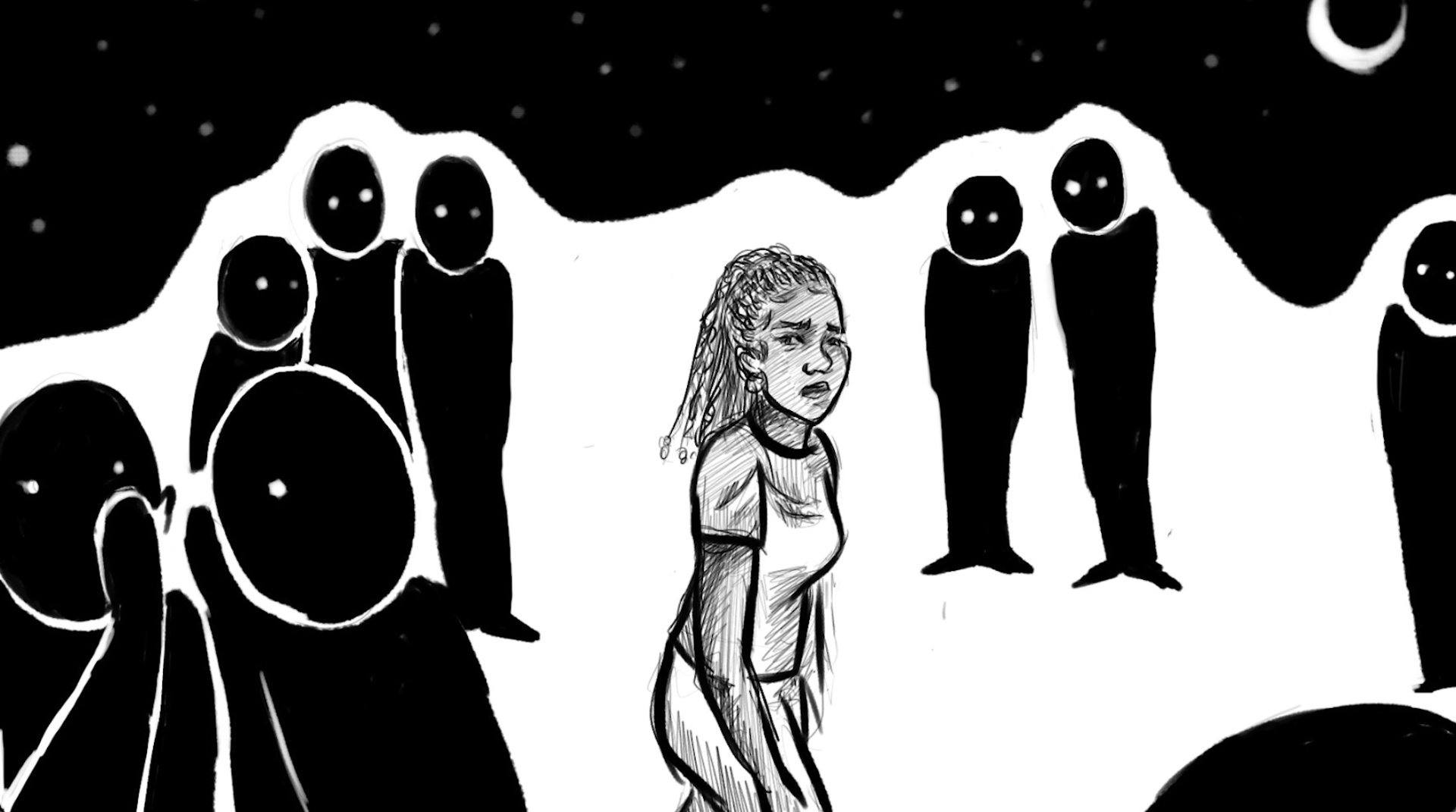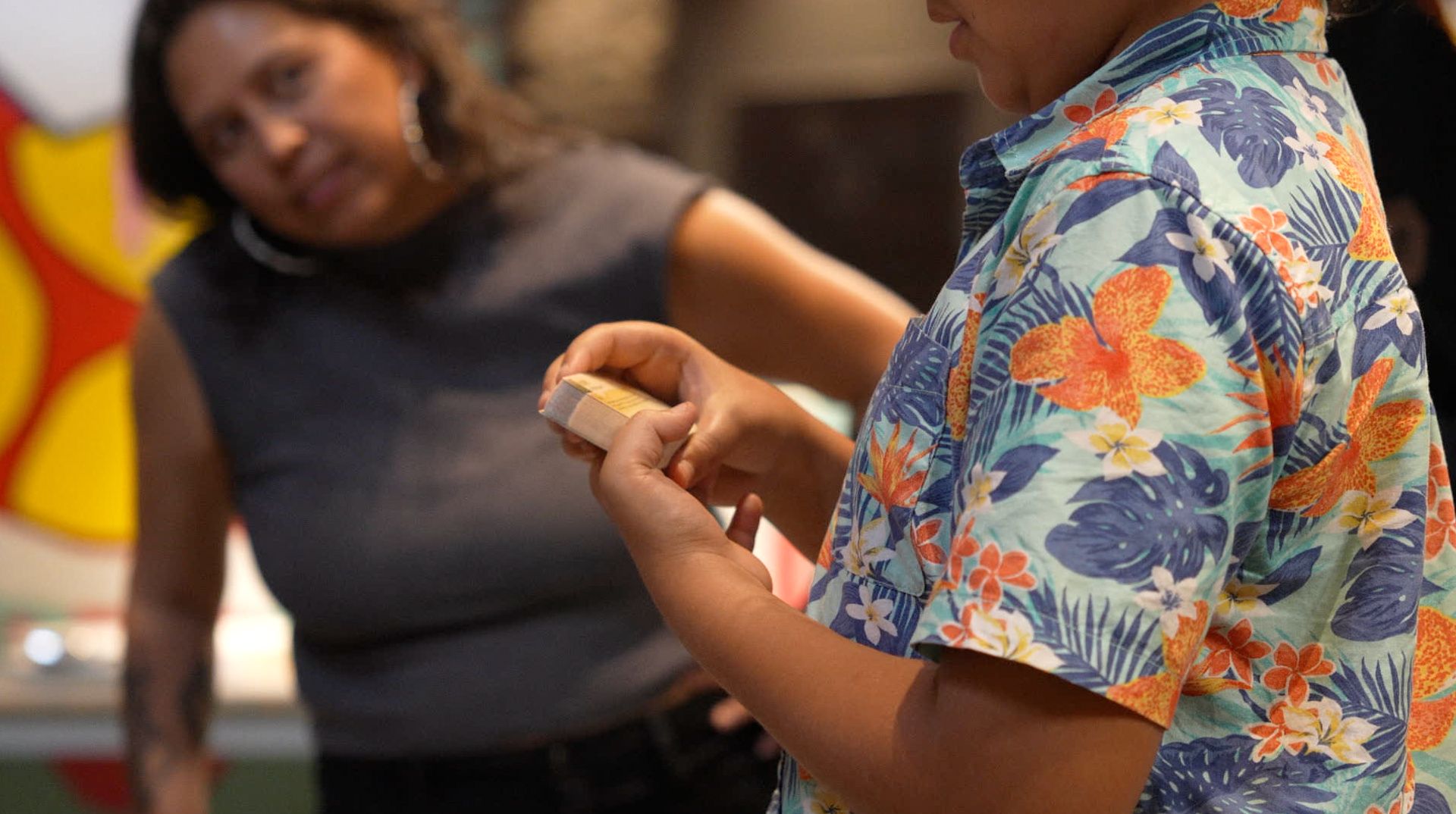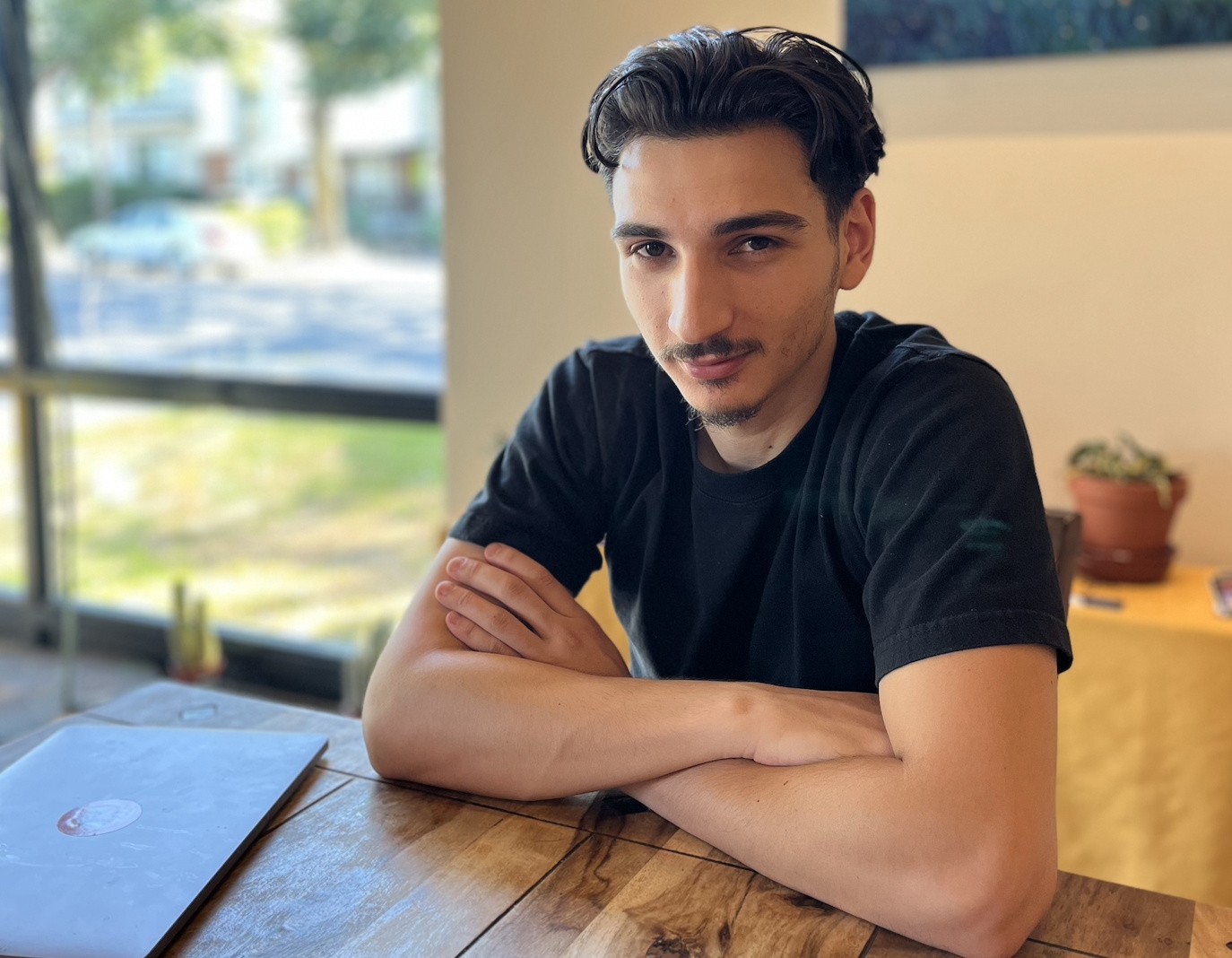The last few weeks have been hectic in the National Assembly. Who is racist? Who is not? Who feels insulted? Who should apologize? These debates garnered a lot of attention in the newspapers and fed into television and radio programs. At the centre of this storm, deputy Haroun Bouazzi is accused of insinuating that his counterparts are racist. Let's break this down.
“I hope you're coming with the intention of apologising.”
“It's you who is in hot water.”
“I don't think you're very comfortable with what you said.”
“Everyone is against you.”
“These people feel targeted and insulted by you.”
These quotes are taken from the show Tout un matin broadcast on November 15 on Radio-Canada. The journalist Patrick Masbourian received Haroun Bouazzi, Québec solidaire MNA representing Maurice-Richard, after the latter made certain remarks at a gala and triggered a large-scale media/political controversy.
As the days went by, negative columns multiplied in the newspapers. Some call him an “ungrateful” man or even a “bridge burner”. Disavowed by his own party, Québec solidaire, he only received rare official messages of support. Not to mention social networks, on which a wave of harassment is sweeping: “He must resign”, “This guy is insulting us”, “An Islamist at work”, “He's a piece of shit”...
Caught in the storm, Haroun Bouazzi announced last Wednesday that he would be absent from the Salon Bleu for a few days. At the time of writing, the MNA for Maurice-Richard had not responded to our interview request.
In order to understand what triggered such a pillory, La Converse interviewed sociologists to decipher the sentence that changed everything, and more particularly the concept of “creating the Other”. To do this, we must first go back a few weeks.
A gala to celebrate excellence in the Maghreb community
During the evening of Saturday November 2, an audience of guests attended the traditional Gala d'Excellence of the Fondation Club Avenir. For 22 years, it has been committed to celebrating members of Quebec's Maghreb community. “Each year, we organize this event in a festive atmosphere and we invite business people, artists, diplomatic representatives, parliamentarians — both at the federal and provincial levels — at both the federal and provincial levels," explains Bachir Halimi, one of the founders of the organization. "This essentially allows us to present the positive achievements of our community, which has chosen Quebec as the host society.”
After admiring an artistic exhibition, while enjoying a cocktail, the guests attended the awards ceremony in the Amphithéatre Banque Nationale at HEC Montréal. In the room, faces were smiling, and the interventions that punctuate the ceremony were warmly applauded. A top athlete, artist, entrepreneur, lawyer or student, the 10 winners of the year rose to the stage one after the other. Already invited to present an award last year, MNA Haroun Bouazzi returned to the stage during this 22 edition of the gala.
“It is all the more important today — and God knows that I see this in the National Assembly every day — the construction of this Other who is Maghrébin, Muslim, who is Black, who is Indigenous, and of his culture which, by definition, would be dangerous or inferior.” — Haroun Bouazzi, Québes solidaire MNA for Maurice-Richard
A midnight blue suit, carmine red tie and sneakers on his feet, the MNA from Québec solidaire was at ease. Mr. Bouazzi devoted his speech to “one of the reasons” why he got involved in politics: the issue of racism.
“There are no human races, of course; there are races that are built by society which creates a category to which a culture is assigned which, by definition, is dangerous, which is inferior. And after 22 years, what you do is very important to break the construction of these mechanisms of racism,” declares the elected official, without knowing that his next sentence will trigger a huge media-political controversy. “It is all the more important today — and God knows that I see this in the National Assembly every day — the construction of this Other who is Maghrébin, Muslim, who is Black, who is Indigenous, and of his a culture that, by definition, would be dangerous or inferior.”
In total, this speech lasted less than five minutes. Applauded by the audience, he returned to his seat, and the evening continued. “I cannot speak for everyone who was present, but it seems to me that, at the time, what people understood was that he said that there was racism in the National Assembly. And this is nothing new, which means that everyone knows that racism exists everywhere. I don't think anyone can tell me that there isn't, but racism is expressed in different degrees, and that doesn't mean that MNAs are racist,” said Bachir Halimi, the co-founder of the Fondation Club Avenir, which organized the gala.
Mr. Halimi points out that representatives of several partisan movements are invited every year, and he states that before they take the stage, a note is distributed to ask the speakers to avoid discussing politics. “We ask them to avoid politics, because we are an apolitical organization. After that, as soon as we talk about integration or social success in a host society, it is necessarily political. Mr. Bouazzi chose to talk about something that is close to his heart, I think,” reflects Mr. Halimi, who would have preferred that the media talk about the Fondation Club Avenir for its actions.
The evening therefore continued with laughter, with the performance of comedian Oussama Fares, and finally with music with DJ Zales. It was only much later that the little melody of scandal was heard.
Columns, emotions, excuses — a hectic week
Ironically, it was Haroun Bouazzi himself who put the video of his speech online, last November 5, on Facebook and YouTube. Although it attracted quite little attention, accumulating only a few hundred views, it nevertheless began to gain media attention. Quickly, we were only talking about the “Bouazzi affair”.
Columnists and politicians accuse the deputy of describing the National Assembly — and its members, by extension — as racist. Unsurprisingly, the PQ leader Paul St-Pierre Plamondon criticized Haroun Bouazzi's “wokism”, whose remarks he equated with “intimidation”.
On the Liberal side, the deputy Marwah Rizqy assures that no one ever made her feel that she was “dangerous or inferior” in the National Assembly, recalling that she is of Moroccan origin. At the same time, Gabriel Nadeau-Dubois and Ruba Ghazal, the two co-spokespeople for his own party, Québec solidaire, called the deputy for Maurice-Richard to order.
“I never said that the National Assembly was racist.” — Haroun Bouazzi, deputy for Maurice-Richard
On Friday, November 15, Mr. Bouazzi was interviewed by Patrick Masbourian during the Radio-Canada morning show. Called on by the journalist to apologize, he reiterated his position. “I never said that the National Assembly was racist,” assured the MNA, who believes that his words were “distorted” and “interpreted” in the wrong way. “As a Quebecer, I have the responsibility to testify and to fight for the principles that are mine, out of love of Quebec and out of love for my people. It takes courage and it's true that there is a headwind,” he adds.
The interview remains to this day his only comment in the media on the subject. During this interview, he tried to specify his thinking, more particularly the concept of “creating the Other”, which is at the heart of the sentence he is accused of having uttered.
After several days of tug-of-war within Québec solidaire, the party adopted a motion denouncing “the unjustified instrumentalization of which immigrants are regularly victims”, while affirming “clearly and unambiguously that Québec solidaire does not support and has never maintained that the National Assembly and its members are racist”. A resolution that Haroun Bouazzi himself supported on November 17.
Two days later, it's on the social network X that the deputy decided to explain himself publicly by playing a balancing act. Although he does not present the formal apologies requested by some, Haroun Bouazzi clarifies his position: “On this day, which promises to be difficult for the parliamentary wing of Québec solidaire, I want to take the time to say some important things. First, I reaffirm my commitment to working alongside my colleagues in the caucus, in the service of our movement and the causes it champions to improve people's lives. In this sense, I join them in saying that I do not consider that the National Assembly and its members are racist and that this is not the position of the party.”
Last Wednesday, the man who is not weathering his first controversy decided to take “a few days” of rest with his family. The columnist and former co-spokesperson for Québec solidaire Amir Khadir is one of the few political figures to defend him. He denounces a “public lynching” and an “orchestrated political execution”.
The creation of the Other: a phenomenon rooted in history
“What is happening, with the Bouazzi affair, is an extreme media reaction around a discourse that, in the end, is quite banal”, comments Catherine Larochelle, a history professor specializing in questions of otherness and postcolonialism. According to her, this case has shone the spotlight on something that is nothing new, since the creation of the Other is a phenomenon rooted in history and studied since the 1960s.
“Othering is based on cultural representations that have existed for centuries,” she says. However, there is not necessarily an intentionality [to create the Other]. It is both the lack of knowledge and the cultural heritage of unconscious biases that lead some to make statements or to pass laws that contribute to this creation of the Other.”
This would be an insidious process of stigmatizing the Other, i.e. the one that is different. “And since immigration is often associated with racialized populations, it creates an equation where there are mostly white Quebecers, then the others.”
Beyond the outrage over the Bouazzi case, this debate would reflect deeper social dynamics and phenomena, including the denial of racism, according to the expert. “The core of Haroun Bouazzi's thinking was never discussed in the debate. We did not want to discuss the construction of the Other.” A reaction from the political sphere that does not surprise Catherine Larochelle, she says.
According to her observations, racialized people are often perceived as being less authorized to speak out about racism in Quebec. “I can see it when I give conferences on the subject: I receive a favourable reception, unlike a racialized person who would say the same things,” she says.
Ignorance and white fragility: structural drivers to stifle debate
According to Leila Benhadjoudja, professor of sociology at the University of Ottawa, “[denying] this 'construction of the Other,' as Mr. Bouazzi mentioned, means wanting to silence denunciations and maintain a power relationship.” This strategy of repression, known as silencing, aims to prevent critical voices, especially those from racialized communities, from fully expressing themselves in public or institutional spaces.
“What we often see is a reversal of roles: those who denounce racism find themselves marginalized, sometimes even perceived as aggressors.” — Leila Benhadjoudja, professor of sociology at the University of Ottawa
According to her, this dynamic is particularly evident in institutions of power such as the National Assembly. “What we often observe is a reversal of roles: those who denounce racism find themselves marginalized, sometimes even perceived as aggressors. In the 'Bouazzi case,'” she says, making quotation marks in the air with her fingers, "it resulted in an attempt to present the white majority as a victim, simply because racism was mentioned.”
M Benhadjoudja associates this creation of the Other with two key concepts: white ignorance, theorized by Charles Mills, and white fragility, formulated by Robin DiAngelo. “White ignorance active production of denial.ot just that we don't know, but rather that we choose to ignore," she insists. "In particular, this denial makes it possible to maintain a facade of innocence, while perpetuating domination.”
White fragility, on the other hand, refers to the defensive reactions of white individuals to discussions about racism or their privileges. “When we talk about racism, the white majority is outraged, says they are hurt. This dynamic then requires racialized communities to apologize for speaking out against racism. It is still a strategy that aims to maintain silence, to stifle critical voices,” she analyses.
The myth of a post-racial society
For M Benhadjoudja, this is part of a larger myth: that of a post-racial society. This idea, according to which Western societies have overcome racial inequalities, serves to distract attention from the systemic structures that perpetuate these inequalities. “We want to believe that we have achieved perfect equality: social, racial, and gender justice. However, it is enough to listen to racialized communities or to consult social and scientific data to see that racism persists,” she says.
This myth, far from being trivial, plays an active role in maintaining power relationships. This logic, rooted in a neoliberal framework, places responsibility on individuals and thus prevents institutions from being questioned. “By reducing racism to individual behaviours, we depoliticize the issue and divert attention from the systemic structures responsible for racial inequalities,” she said.
MBenhadjoudja points out that, while biological racism has lost legitimacy, it has evolved to take on a cultural form. “Today, we talk about integration challenges or cultural differences, but the essence remains the same: presenting the Other as a problem.” Citing the African American sociologist W. E. B. Du Bois, she asks: “What does it feel like to be perceived as a problem? Who is identified as a problem in political or media discourse? What communities are considered to be threats? Who has the power to define the Other, to build this otherness? Who occupies the decision-making bodies? ” she lists.
This reversal of responsibilities would be particularly problematic. “What is becoming a source of outrage is not that racism exists, but that we dare to talk about it!" she exclaims. "Refusing to see the racist nature of these speeches is the height of it all! ”
In Montreal, racialized youth express a feeling of “stigma” in public debate.
“Young people feel that their culture is being demonized”
Sparkling and direct, Marie-Christine Jeanty uses derision to address complex subjects. Employed at the City of Montreal, she prefers to present herself as the former vice-president of the Intercultural Council of Montreal, a role that better reflects her career in the fight against inequalities. A commitment transmitted by her Haitian parents, who are themselves very active in the fight against racism and other social causes. Her mother, Maryse Alcindor, was the first Black woman to become, in 2005, Deputy Minister for Immigration and Cultural Communities. Her father, who died four years ago, was chairman of the board of directors of La Maison d'Haïti in Montreal.
For M Jeanty, who Bouazzi, the latter has nothing to blame himself for. “What he said are things that I hear and that I see. Young immigrants, for example, often think that they have no place here,” she said, even if she is not surprised by the proportions taken by the controversy.
According to her, the search for identity of the young people she meets is due to negative discourses against immigrant, racialized and marginalized communities. This “construction of the Other” would therefore have repercussions on those who are the object of it. “Young people often tell me that they feel that their culture is being demonized. They cannot be fully themselves in this society. So they ask themselves, 'What is our place?' They have the impression of never doing enough to show that they are 'good immigrants,'" she reports. “We are always made to feel that we are the Other, all the time,” they confide to Marie-Christine Jeanty.
Indeed, this is the feeling that Aya, a young international relations student, says she felt when faced with the controversy surrounding Haroun Bouazzi. “Stories like that of Mr. Bouazzi demonstrate that we do not really have freedom of expression, and that discourages us enormously at the political level. No matter what you say, no matter what you think, even if you try to say it correctly and in a kind way, it will be misinterpreted. I find it disheartening, especially for young people,” she says.
The young woman sees it as “a double standard” as well as an indignation that would vary in geometry. “Mr. Legault, our Prime Minister, sometimes uses words that are very denigrating to immigrants. For example, when he said that 100% of the housing crisis is due to immigrants, I did not understand why it did not elicit more reactions”, underlines Aya.
Imen, 22 and a member of the Saint-Michel Youth Forum, also shares a skeptical view of the political world. However, she prefers to remain hopeful: “Honestly, having people like (Bouazza) in politics gives me confidence again. Despite everything he has gone through, I am focused on the fact that there are people like him to make things happen and to serve citizens.”









%20(1).jpg)
.jpg)
.jpg)